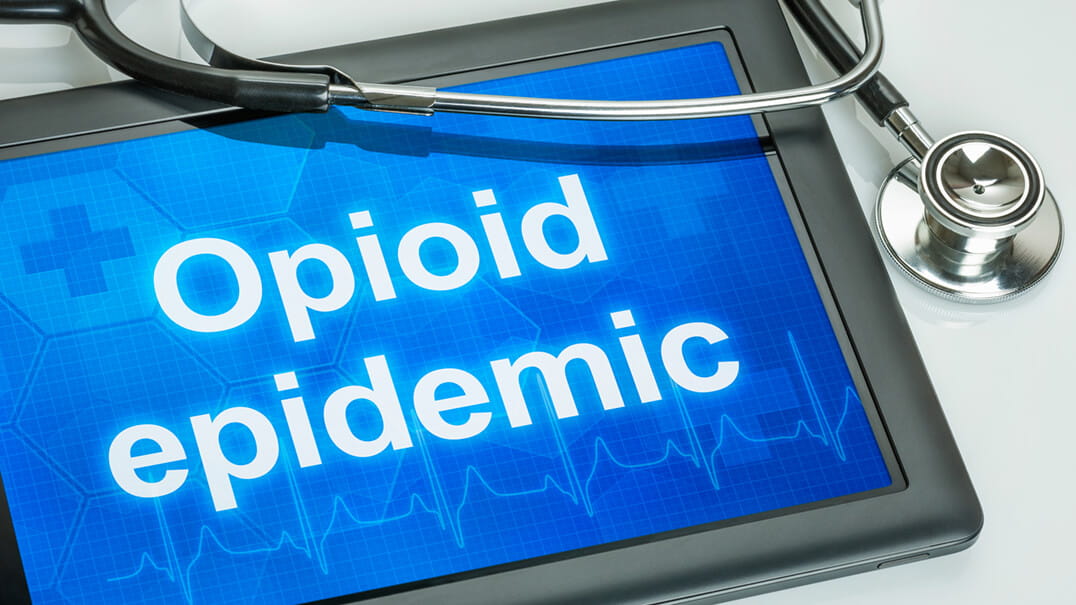A neighbor, teacher, farmer. A CEO, professional athlete, retiree. Prince. A movie star. Opioid addiction cuts across all layers of the human experience: age, gender, geography, occupation, and socio-economic level. It’s a scourge that has radiated across the U.S., becoming an epidemic of such proportions that it is now considered a public health emergency.1
For many Americans, like author and actress Jamie Lee Curtis, opioid misuse begins with a legal prescription. “Most people who become addicted, like me, do so after a prescription for a painkiller following a medical procedure. Once the phenomenon of craving sets in, it is often too late,” she said.2 Curtis considers herself “one of the lucky ones,” now sober for more than 17 years after an opioid addiction.
What Is an Opioid?
Opioids such as codeine and morphine have long been in the lexicon of public health professionals, particularly those who work in the field of drug rehabilitation. But today, the classification has expanded to include “the illegal drug heroin, synthetic opioids such as fentanyl, and pain relievers available legally by prescription, such as oxycodone (OxyContin®), hydrocodone (Vicodin®), codeine, morphine, and many others,” according to the National Institute on Drug Abuse.3
Perhaps the best way to understand the enormity of the opioid crisis is through the numbers. The U.S. Department of Health and Human Services (HHS) compiled the following information based on data from 2016. Here, as presented in the report, are seven alarming opioid facts every public health nurse should know: 4
- 116 people died every day from opioid-related drug overdoses
- 11.5 million people misused prescription opioids
- 17,087 deaths attributed to overdosing on commonly prescribed opioids
- 170,000 people used heroin for the first time
- 948,000 people used heroin
- 19,413 deaths attributed to overdosing on synthetic opioids other than methadone
- $504 billion in economic costs
Ending the Epidemic
The numbers are sobering, but they have served as a call to action and have focused efforts on crafting solutions. HHS has identified the following five priorities to help curtail this staggering crisis:5
- Improving access to treatment and recovery services
- Promoting use of overdose-reversing drugs
- Strengthening our understanding of the epidemic through better public health surveillance
- Providing support for cutting edge research on pain and addiction
- Advancing better practices for pain management
The American Nurses Association (ANA) has acknowledged the important role all those pursuing nursing careers will play in curtailing the opioid epidemic and pledged its support: “As healthcare providers practicing on the front lines of the opioid epidemic, registered nurses are qualified and well-positioned to play a leading role in assessing, diagnosing, and managing patients battling addiction,” the association said. “Stemming the tide of opioid addiction and overdose deaths in the U.S. demands a comprehensive approach. ANA recognizes the significance of this public health crisis and is committed to helping nursing stand as a leading provider in the fight against opioid dependence, overdose, and death.”6
Wanted: Nurse Leaders
Public health nurse leaders improve health outcomes for entire communities. A Master of Science in Nursing (MSN) degree with a specialization in Public Health Nursing can prepare you for a leadership role in addressing the opioid crisis at the community level. Public health nurses are in demand for jobs in home health agencies, schools, healthcare facilities, and public health departments, where their work has lowered healthcare costs through programs involving preventive care, screening, and education.
To help meet the demand for MSN nursing degrees, online nursing schools are creating flexible, innovative programs for adult learners who want to advance their public health careers. With the RN to MSN track at Walden University, you’ll design, develop, and implement a public health project in a professional healthcare setting. That’s the sort of valuable, real-life experience you’ll bring to community health nursing.
Walden's Master of Science in Nursing program can help you lift your community—rural, suburban, or urban—to better access and care. It can help you identify and prepare for the role you will play in reversing the cycle of opioid addiction. A master’s degree in nursing can open doors to career opportunities you’ve not yet dreamed of. Follow the path from RN to MSN online and find your purpose as a public health nurse.
Walden University is an accredited institution offering an online Master of Science in Nursing program with a specialization in Public Health Nursing—one of the few of its kind offered fully online. Expand your career options and earn your degree in a convenient, flexible format that fits your busy life.
2Source: www.huffingtonpost.com/jamie-lee-curtis/kill-the-pain_b_9849582.html
3Source: www.drugabuse.gov/drugs-abuse/opioids
4Source: www.hhs.gov/opioids/sites/default/files/2018-01/opioids-infographic.pdf
6Source: www.nursingworld.org/~4ae212/globalassets/docs/ana/ana_nursings-role-in-opioid-crisis_2016.pdf
Walden University is accredited by The Higher Learning Commission, www.hlcommission.org.




